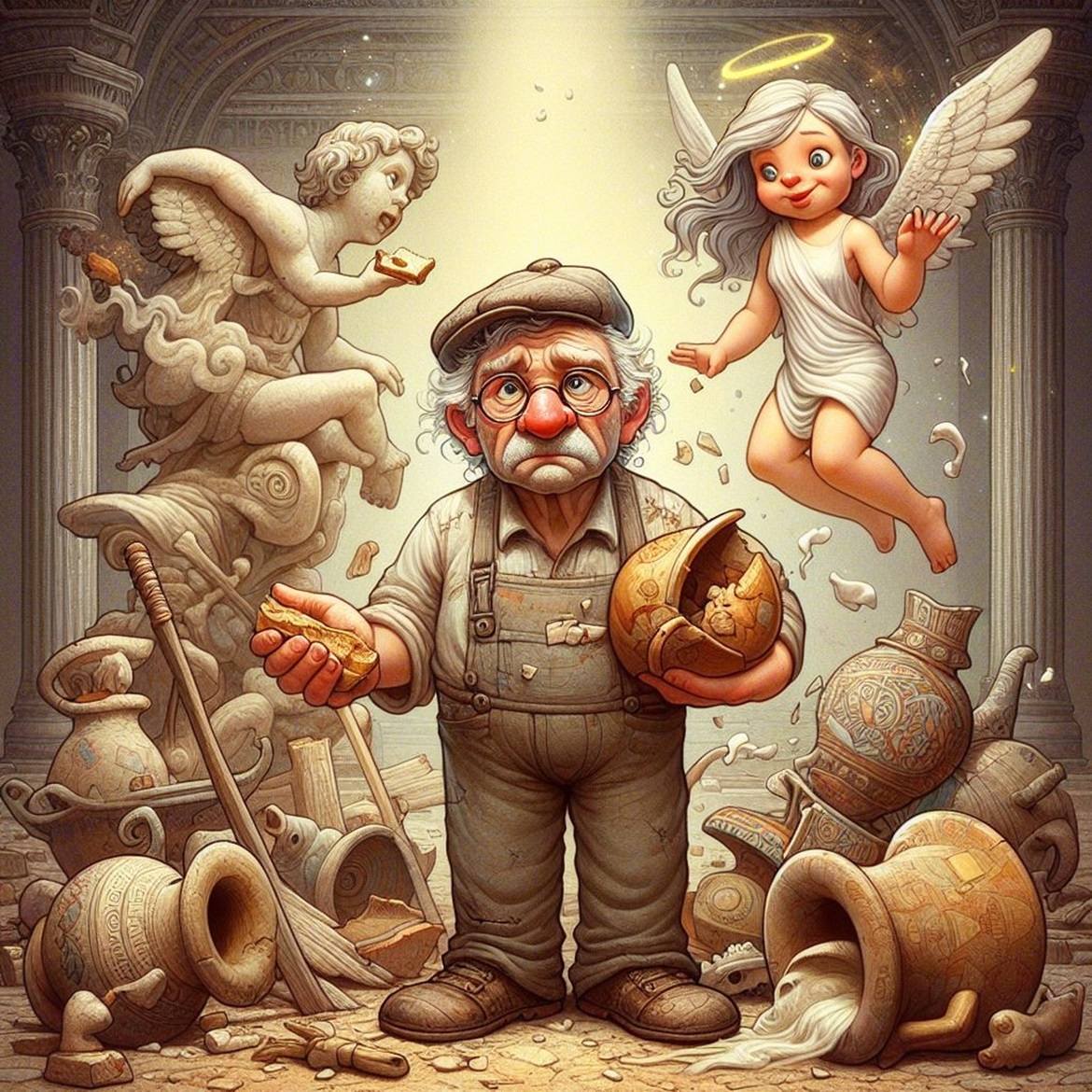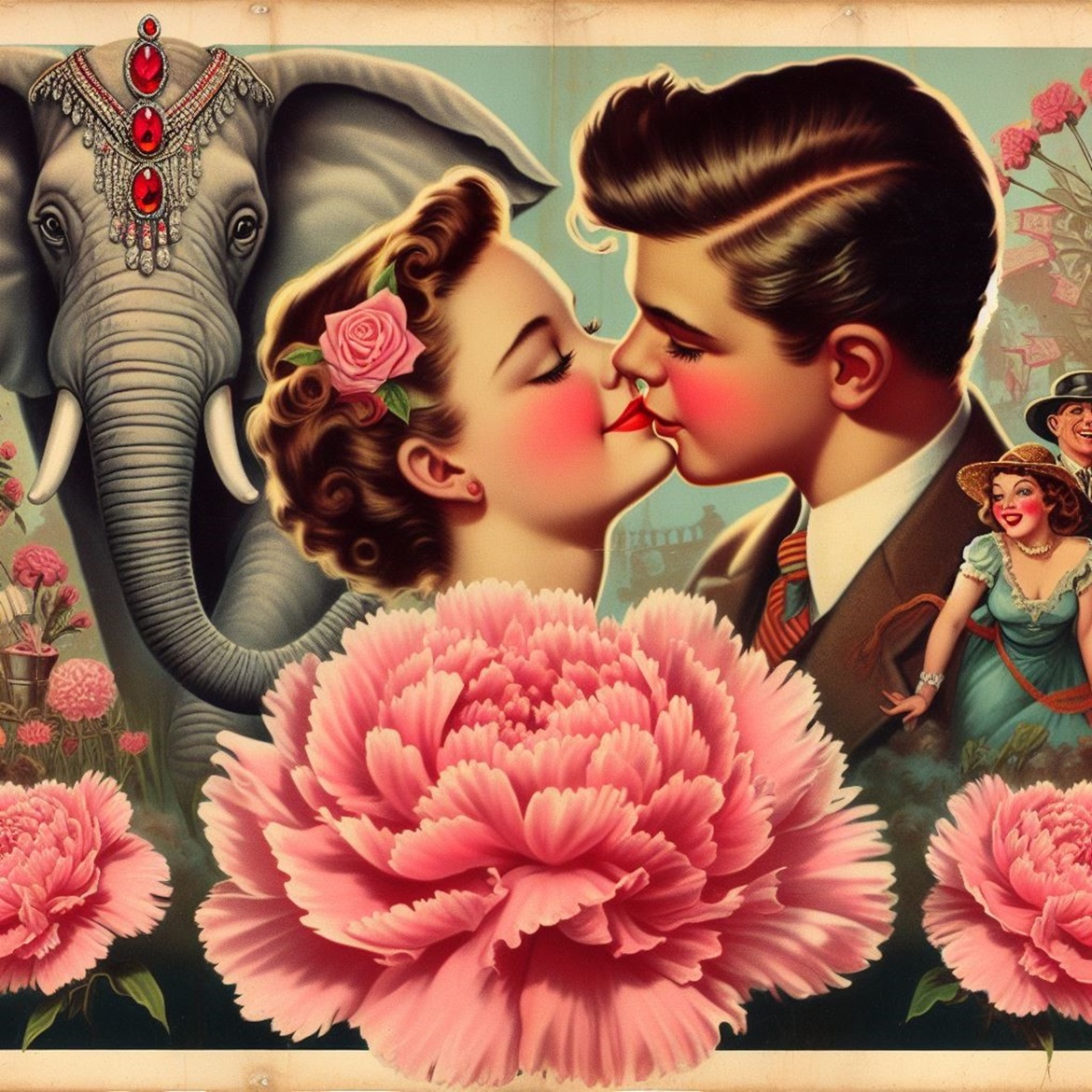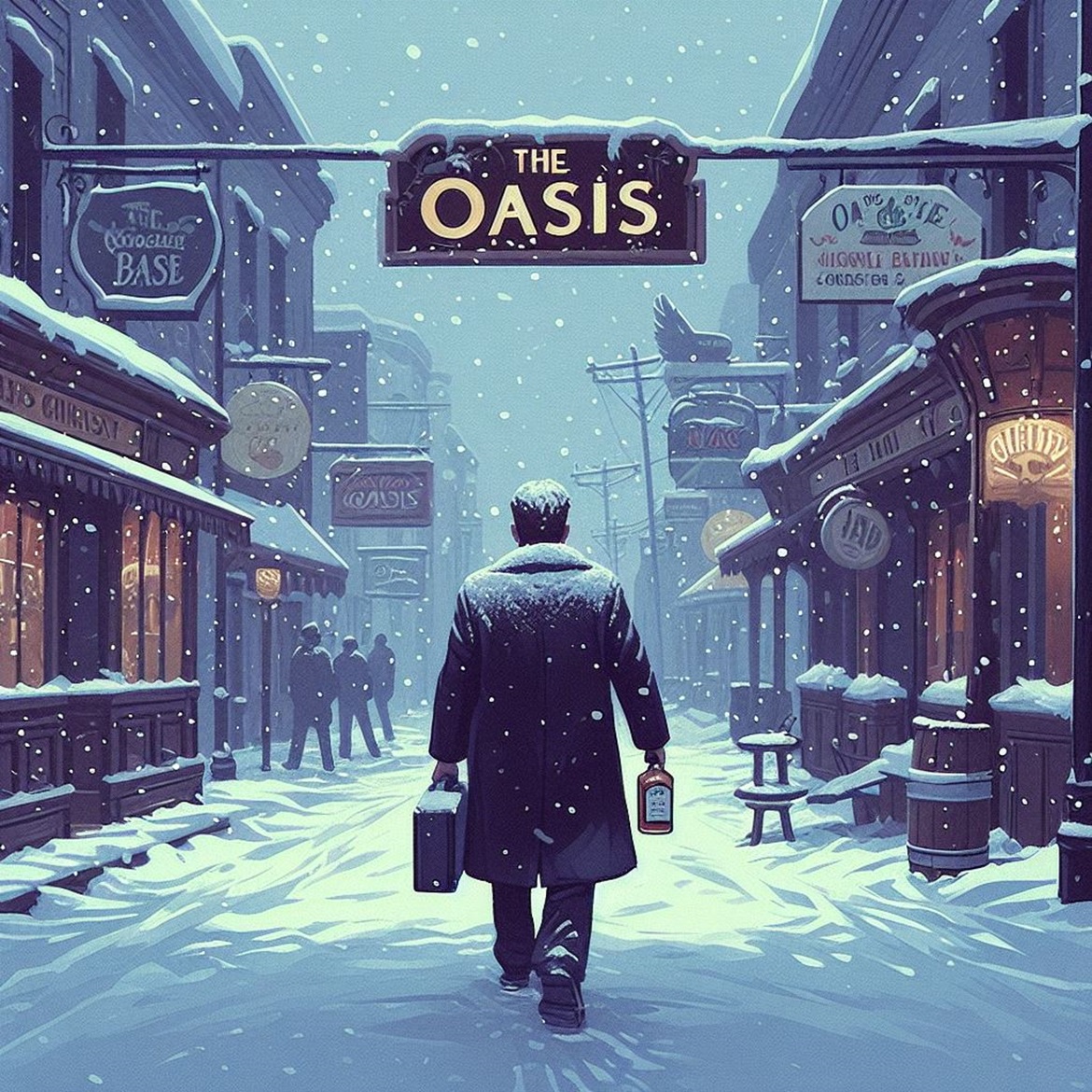In the sleepy town of Bedford, where the most scandalous event in recent memory was Mrs. Penelope’s cat learning to open her mail, there existed a museum so ancient, even the dust motes had stories to tell. This museum, the Keeper of Times Past, was not as renowned as those big city establishments where one could briskly elbow through crowds to glimpse a starry night or a lass with an enigmatic smile. Oh, no. The Bedford museum was far more intimate, offering a unique collection that included the Legendary Spoon of Elderton and the infamous Knitwear of the Lost Explorer, among other curiosities.
The crown jewel of the museum, however, was the Whispering Vase of Tharros. An artifact so old, historians gave up trying to date it and simply labeled it as “Really, Truly Ancient.” Legend had it that the vase had the power to grant unparalleled wisdom to any who could decipher its whispers, assuming one was willing to stand upside down, facing westward during a solstice. Needless to say, no one had ever heard more than a drafty sigh.
Enter our protagonist, Gilbert Blythe—not the Anne of Green Gables chap, but rather an unassuming janitor with an unmatched knack for unintentionally causing chaos. Gilbert, hired by the museum for his purported attention to detail (a misconception arising from his detailed excuses for being late), was blissfully ignorant of the artifacts’ significance. To him, the Whispering Vase was merely Vase #42, a significant dust collector.
One silent morning, as the sun attempted a weak display of authority over the town, Gilbert began his routine in the Grand Hall, armed with a feather duster and a sense of purpose generally reserved for knights of yore. Humming a tune that was neither pleasant nor entirely coherent, he approached the podium on which the Whispering Vase of Tharros stood.
What followed could only be described as a comedy of errors. In a sequence of movements that involved an ill-timed sneeze, a startled jump, and a catastrophic loss of balance, Gilbert managed to send Vase #42, the Whispering Vase of Tharros, crashing to the floor. The vase shattered into a myriad of pieces, silent as the secret it had kept for eons.
The sound of the vase breaking echoed through the halls like the cry of a banshee at a library’s quiet hour. Gilbert, pale as milk left out on a winter’s day, stared at the catastrophe, certain his next job would involve less history and possibly more oranges.
Before panic could fully set in, two things happened almost simultaneously. First, the museum curator, Mr. Winsley—a man so strict his own eyebrows rarely dared to rise in surprise—entered the hall. Second, from the shattered remnants of the vase, a soft, ethereal voice began to speak.
“I’m free! Oh, blessed daylight, how I’ve missed thee!” The voice, surprisingly cheerful for something that had just been through trauma, filled the hall.
Mr. Winsley, whose heart had hardened like a forgotten loaf of bread, stopped dead in his tracks. “The vase… spoke?” he gasped, making a mental note that perhaps he ought to have tried that upside-down solstice thing after all.
Gilbert, equally astounded, nodded. “Yep, that it did. And it seems pretty happy about it, too.”
The voice, now clear as a bell on a crisp winter morning, continued, “Oh dear curator and accidental liberator, I am Thalia, the spirit of mirth and good cheer, bound by an ancient curse to provide wisdom within the confines of that dreary vase.”
Mr. Winsley, whose knowledge of ancient cultures was extensive, blinked. “Thalia? As in, the Greek Muse?”
“The very same!”
Gilbert, who thought a muse was something artists listened to when painting, scratched his head. “So, what happens now?”
Thalia’s voice danced in the air. “Now, oh kind janitor, I shall grant each of you one wish, as thanks for my liberation.”
Mr. Winsley, ever practical, immediately saw an opportunity. “I wish for a priceless artifact to replace the one we’ve lost, something that will bring fame to the Bedford Museum.”
“And you, dear janitor?” Thalia inquired.
Gilbert, simpler in his desires, shrugged. “I could do with a really good sandwich right about now.”
As if by magic—which, considering a Greek Muse was involved, wasn’t too far off—the hall shimmered. A new vase appeared on the pedestal, somehow grander and more inviting than the Whispering Vase of Tharros had ever been. Beside Gilbert materialized a sandwich of such divine aroma, the likes of which had never been encountered in Bedford.
Peer less than a fortnight later, news had spread far and wide not just of the museum’s new acquisition, but of the sandwich that had vanished between bites, leaving Gilbert sighing in culinary bliss.
The museum’s fame skyrocketed, with queues stretching longer than Mrs. Penelope’s cat’s newfound list of misdemeanors. Scholars, historians, and the casually curious flocked to witness the new vase, which, to everyone’s mild disappointment and Mr. Winsley’s silent relief, offered no whispers, just an ineffable allure.
The tale could end here, a neat wrap-up to an adventure in museum keeping and mystical happenings. Yet, there’s a twist in the tale.
On a day much like any other, when the line outside the museum had become a permanent fixture of Bedford, Gilbert was approached by a scholarly type with a frantic look and a clipboard clutched like a lifeline.
“Did you, by any chance, make a wish concerning a sandwich?” the scholar asked, breathless.
Gilbert, who had by this time gained a certain fame as the resident ‘Sandwich Summoner,’ nodded. “That I did. Best sandwich I ever had.”
The scholar’s eyes widened. “That sandwich, sir, was no mere culinary delight. It was a recipe lost to time, known only in the most hallowed halls of Ancient Greece. A sandwich that philosophers dreamed of and could never taste. The Sandwich of Socrates, it was called!”
And so, Gilbert Blythe, not the Anne of Green Gables chap, but our intrepid janitor, had unwittingly consumed not just an extraordinary sandwich, but a relic of gastronomic history so profound, it vaulted him into the annals of legend.
As for the Bedford museum, it became the cornerstone of a town transformed by wonder, whimsy, and the occasional waft of an inexplicably savory aroma. And Thalia, muse of mirth, found herself a new home, whispering inspirations and ensuring that life in Bedford remained as enchanting as ever.
In the end, it wasn’t artifacts or ancient vases that drew people from far and wide, but the story of a man, a muse, and the most valuable sandwich ever eaten.




